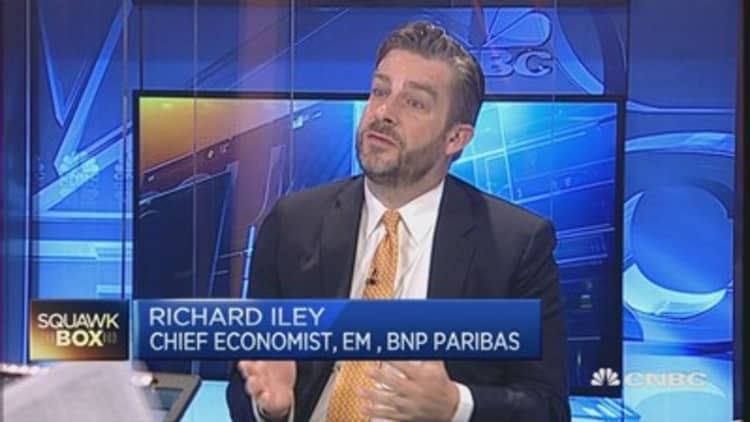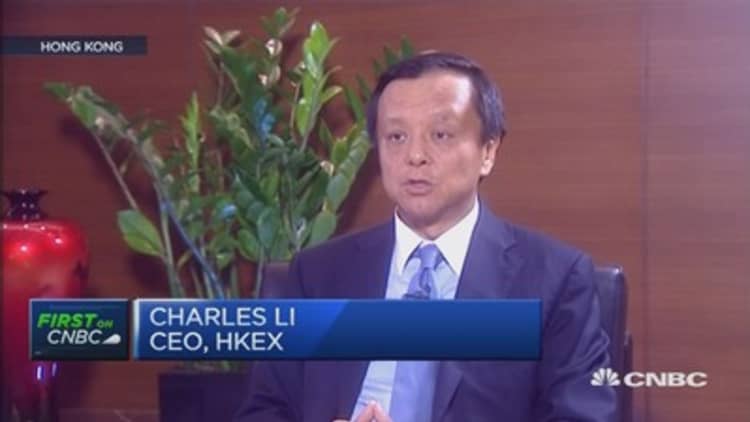
The People's Bank of China (PBoC) weakened the against the dollar for a third consecutive day on Thursday, following reports the central bank intervened to stem the currency's sharp slide late on Wednesday.
The PBoC set the yuan fixing at 6.4010, compared to the previous day's close of 6.3870, sending the currency to 6.40 per dollar in morning trade.
Thursday's fix was 1.1 percent below Wednesday's fix of 6.3306, a pause from the aggressive weaker fixings in recent days: On Tuesday the fix weakened 1.9 percent and then 1.6 percent on Wednesday.
Read MorePBoC: Yuan won't drop 10%
Traders said Thursday's slower pace of devaluation made sense following reports by the Wall Street Journal that the central bank asked state-owned lenders to sell dollars on its behalf in the last 15 minutes of U.S trading on Wednesday, which caused the yuan to rally 1 percent against the greenback after falling to fresh four-year lows in intraday trade.
Earlier on Wednesday, the PBoC warned it was not pursuing steady depreciation in response to allegations that Beijing was manipulating the currency to boost exports.
The central bank has yet to confirm the supportive action, but it is broadly being treated as fact by market insiders.
Cold feet
Wednesday's intervention signaled the central bank may have gotten cold feet about its commitment to loosen the reins on the exchange rate. Experts say the PBoC acted to prevent the renminbi from falling too rapidly, a consequence that was widely flagged when the PBoC first announced a more market-oriented yuan just 24 hours earlier.
"It looked as if the rules of the game were clear...but we realize by the PBoC's massive intervention to keep the exchange at a depreciated but manageable level, this will not be as simple as that," Natixis said in a report.
The PBoC devalued the currency by about 2 percent on Tuesday and said it would set the spot rate according to the previous day's closing central parity rate, effectively allowing the currency to trade freely and inviting near-term currency weakness. Wednesday's poor July industrial production data also increased pressure for even more depreciation, National Australia Bank economists warned in a report.
But by allowing a "floating" currency and consequently more weakness, the PBoC was risking accelerating capital outflows, which have been widening since the third quarter of 2015, Natixis noted.
"We should realize that these outflows were happening at the time of a bull stock market and expectations of RMB depreciation. This clearly explains the PBoC's interventionist mood and why the RMB cannot really go as far as it may need to regain the competiveness lost."
So, was Wednesday's action a sign that the central bank is backtracking from the promises it made? Not quite, given many investors were always skeptical regarding the PBoC's tolerance for a declining currency.
"It would be out of character for Chinese financial regulators to drop the reins on the exchange rate so suddenly. More likely, the PBoC will intervene in foreign exchange markets to slow the yuan's depreciation and force a short-lived appreciation of the yuan at some point in coming weeks in an attempt to prevent the exchange rate from becoming a one-way bet," explained Bill Adams, senior international economist at PNC Financial Services.
Still, Wednesday move has only deepened uncertainty about the central bank's outlook for the currency. "The PBoC has not won Oscars for its communication skills of late," noted David Goldman, Reorient Research managing director.
More intervention?
Indeed, more stabilization efforts are certainly on the table.

"Clearly, there is a strategy of generalized devaluation. They do want to get the renminbi down—at least 5 or 10 percent—but they're going to make sure that it's orderly and they have the firepower to ensure that," Richard Illey, chief economist of emerging markets at BNP Paribas told CNBC.
Adams, meanwhile, believes policymakers will step in aggressively if the yuan depreciated to more than 7 per dollar.
On the bright side
Despite the central bank's seemingly back-and-forth actions, there are some optimists out there.
Wednesday's intervention was a sign that Beijing won't allow a greater currency war to break out, Rebecca Patterson, Bessemer Trust 's Chief Investment Officer, told CNBC. "The fact that China intervened to support the renminbi suggests we won't reach that worst case scenario."
Asian currencies have sold off sharply since Tuesday amid fears a weaker yuan would hurt their trade competitiveness. But Wednesday's move helped battered regional currencies like the Malaysian ringgit, Indonesian rupiah, Australian dollar and Singapore dollar rebound on Thursday.
Meanwhile, others believe that intervention could eventually result in broader two-way trading.
"We consider the intervention a hopeful sign that the authorities are not shooting for a maxi-devaluation, which we expect will result in market pressure on the spot rate gradually becoming more two-way," said Tim Condon, head of research at ING.

